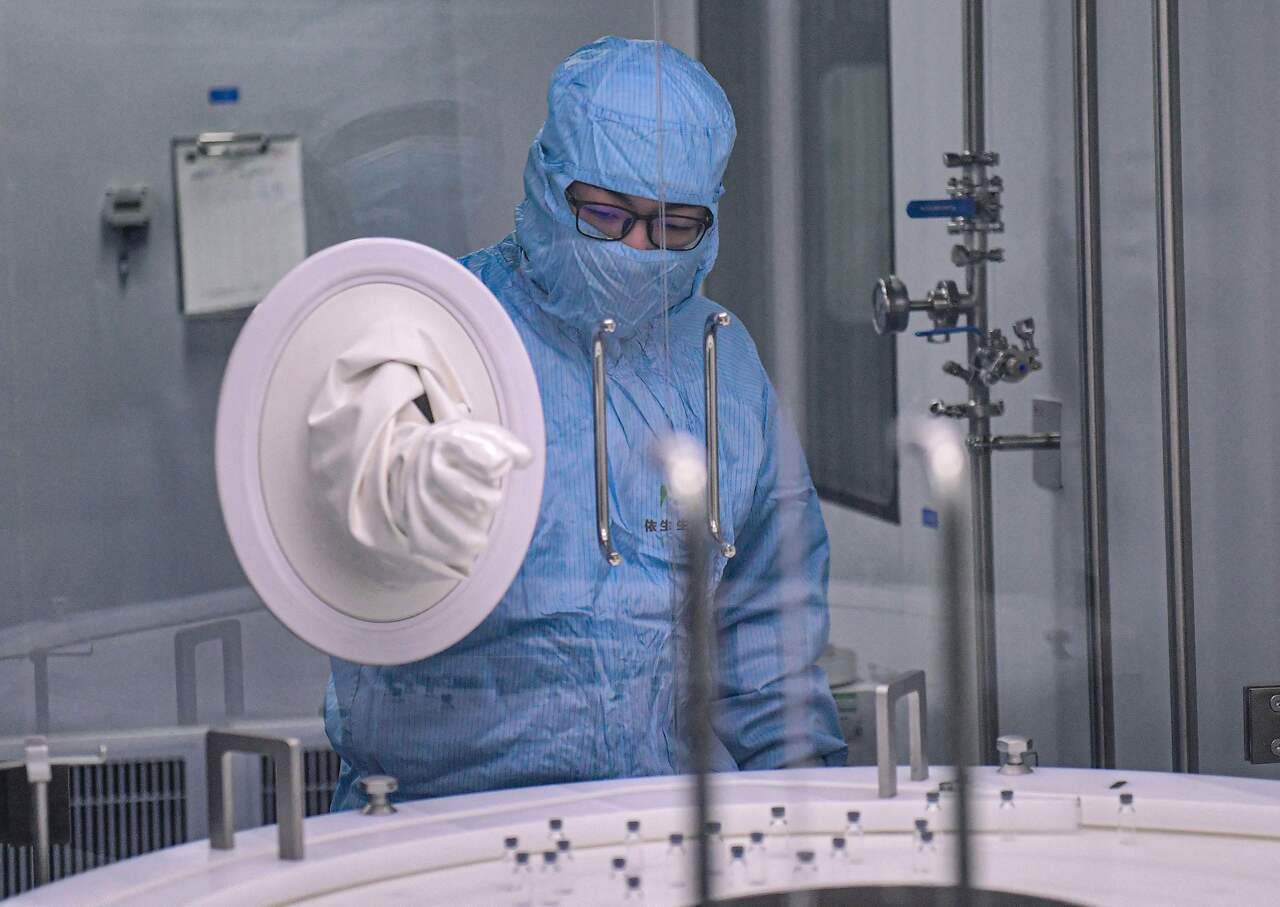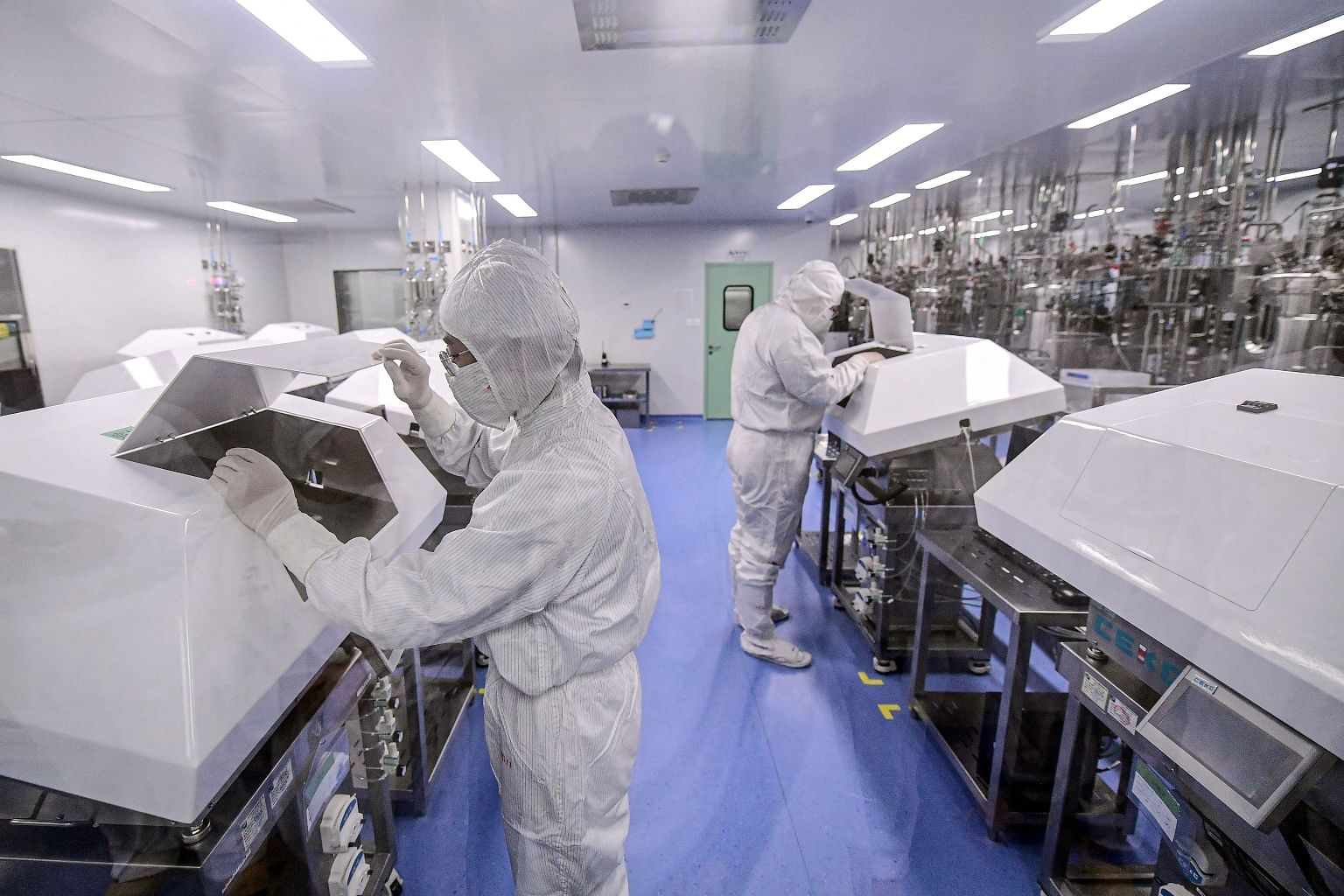Where China's Covid-19 vaccine development is going
Sign up now: Get insights on Asia's fast-moving developments

An employee works at a facility producing a Covid-19 coronavirus vaccine in Shenyang, China, on April 19, 2022.
PHOTO: AFP
Follow topic:
BEIJING (CAIXIN GLOBAL) - More than two years into the pandemic, scientists and regulators are still struggling to catch up with the stealthy, rapidly mutating coronavirus as it continues ravaging the world.
Despite the number of effective Covid-19 vaccines in use around the world, new variants increasingly find ways to break through immune system defences and infect more people. It has become a pressing issue for scientists to find more powerful weapons for containing the new variants.
Researchers and regulators around the world have geared up to develop a next generation of Covid-19 vaccines that are more effective in containing the dominant, highly transmissible omicron variant and sub-variants, which are likely to drive another wave of infections in the fall and winter. Studies of omicron-adapted vaccines in China started as early as December after the Hong Kong outbreak.
In addition to upgrading existing vaccines, researchers have begun pursuing what may be the ultimate goal of somehow creating a so-called broad-spectrum vaccine that could protect against future variants of the virus. Companies including Pfizer, CanSino and CNBG have initiated research on such new vaccines. But experts said it's a remote goal based on current technologies. Research is still at a very early stage.
"There is still a long way to go for broad-spectrum vaccines," said Zhu Fengcai, deputy director at the Jiangsu provincial disease control body. "Challenges are enormous."
Meanwhile, investors have cooled on backing more Covid vaccines in China and elsewhere. Even within the industry, there's disagreement on the business case for developing new inoculations as some drug-makers are shifting to other priorities while others are doubling down on the expectation of sustained Covid vaccine demand for years to come.
The development of Covid vaccines is not a sprint but a marathon, said Wu Ke, chairman of Chinese biotech firm Wuhan BravoVax.
Current Covid-19 vaccines are mainly based on the original strain of the SARS-CoV-2 virus that emerged in Wuhan in late 2019. But since then, the virus has continuously evolved with mutations in its spike proteins, which the pathogen uses to bind to and infect host cells, spurring concerns about vaccine efficacy. The omicron variant that started sweeping the world in late 2021 contains many more mutations than previous variants, making it more transmissible and more adept at evading the immune responses generated by today's vaccines or by natural infections, studies showed.
In January, the World Health Organisation (WHO) predicted that the effectiveness of existing vaccines would be reduced against symptomatic disease caused by the omicron variant, although protection against severe disease was likely to be preserved. The organisation encouraged the development of Covid-19 vaccines that have a high impact on prevention of infection and transmission. Until such vaccines are available, the composition of current vaccines may need to be updated to ensure protection against the ever-evolving virus, the WHO said.
On June 28, the Vaccines and Related Biological Products Advisory Committee of the US Food and Drug Administration (FDA) voted to include an omicron component in vaccines that would be used for boosters starting in the fall of 2022.
The decision is likely to promote the creation of the world's first bivalent Covid-19 vaccines targeting the omicron variant. FDA experts advised manufacturers that they should develop modified vaccines by adding a component of the omicron sub-variant BA.4 or BA.5 to the current vaccine composition to create a two-factor booster vaccine.
The European Medicines Agency also suggested that vaccines be tweaked to include the omicron strain to improve protection when used as a booster. Global regulators agreed on key principles for updating Covid-19 shots to respond to emerging variants, the agency said July 1.
The assessments and research by US and European experts on the Covid-19 vaccines will have a major influence on China's vaccine development and supervision, a senior researcher said.
Chinese vaccine makers have widely started to use new virus strains to replace the original one in vaccine development no matter what technology path they follow, several vaccine companies told Caixin. As the third autumn of the pandemic approaches, vaccine makers must accelerate preparations of new shots adapted to the new variants, experts said.
Race against the virus
With a host of unusual mutations giving it the ability to evade immune responses, the omicron variant quickly became the dominant strain worldwide. The widely used mRNA vaccines, which are believed to be the most protective shots so far with 90 to 95 per cent efficacy against infection by the older virus, showed only half the ability to protect people against omicron.
According to a study published in June by the science journal Nature, the protection rate against the omicron BA.1 sub-variant dropped to 46.6 per cent and against BA.2 to 51.7 per cent within three months after a second shot of the Pfizer-BioNTech vaccine. The performance of the rival Moderna shot was similar.
Most countries have adopted booster shots to enhance protection. A study by the University of Hong Kong during the city's omicron outbreak this year found that a three-shot inoculation with Pfizer's mRNA vaccine could offer 86 per cent protection against hospitalisation and with Sinovac Biotech's inactivated virus vaccine, 63 per cent. Both were 97 per cent effective against death.

But the protection offered by boosters faded quickly. Data released by the US Centres for Disease Control and Prevention showed that in BA.1 infections, protection against hospitalisation dropped from 92 to 86 per cent three months after a third mRNA shot. The figure slid from 71 to 55 per cent after three months for BA.2 infections.
Scientists are seeking to upgrade existing vaccines with omicron components to make them more effective. In June, Pfizer-BioNTech and Moderna both reported major progress in clinical trials of upgraded vaccines. At the June meeting with the FDA, drug-makers promised to be ready to supply enough new shots by the fourth quarter. It is expected that the US will start offering a fourth shot with upgraded vaccines in October.
Chinese vaccine makers have been working on omicron-specific vaccines using different technologies, Zheng Zhongwei, an official who oversees Covid vaccine development at the National Health Commission, said in March.
Inactivated virus vaccine makers China National Biotec Group (CNBG) and Sinovac are leading the race. Both companies started clinical trials in May of new vaccines designed for omicron. Shots under development by CNBG and Sinovac continue using the inactivated virus technology.
But experts say they are concerned that it will take much longer using such technology to upgrade a vaccine compared with newer technologies such as mRNA. "To change the strain for inactivated virus development is almost equivalent to the development of a brand-new product," an industry source said. "There is no shortcut."
Some companies decided to shift technologies to a faster track. CanSino Biologics, the developer of a recombinant viral vector shot, switched to the mRNA technology for development of its omicron-adapted vaccine. Shenzhen Kangtai Biological Products, which rolled out an inactivated virus vaccine last year, also shifted to the new mRNA technology. Another widely used technology option is recombinant protein vaccines. Anhui Zhifei Longcom Pharmaceutical, whose shot was approved in March as the only recombinant protein Covid vaccine in China, is working on a bivalent vaccine for the omicron and delta variants.
Compared with the mRNA technology, which scientists can use to tweak a strain in less than two months, recombinant protein vaccines usually take more time, though less than for inactivated virus vaccines, said Lu Mengji, a professor from the Institute of Virology at the University Hospital of Essen in Germany.
Several Chinese vaccine industry insiders said they expected more Covid vaccines to win approval next year. There are likely to be technological breakthroughs with the debut of new vaccines, such as shots that protect against more variants or those can be inhaled, said Zhang Lunan, executive director of Advaccine (Suzhou) Biopharmaceuticals.
Ebb tide for funding
While scientists are still in the long race to develop more-effective Covid vaccines, investors' enthusiasm is fading. Investors worldwide rushed into the vaccine industry in 2020 and 2021, betting billions of dollars on new products.
But the tide is ebbing this year, a health-care industry investor said. The success of Pfizer and Moderna's mRNA shots encouraged investors to pour money into China's mRNA vaccine startups. In Nov 2021, Abogen Biosciences raised US$300 million (S$422 million) from investors led by SoftBank Vision Fund and 5Y Capital, only three months after a previous funding round generated US$720 million. In June that year, mRNA vaccine developer Stemirna Therapeutics secured US$200 million of investment.
But the frenzy has cooled as China's mRNA vaccine development fell short of expectations. China approved public inoculation of seven domestically developed Covid-19 vaccines, but none based on the advanced mRNA technology.
"There are only two companies that have mastered the full set of technologies for the industrialisation of mRNA vaccines, and China is still in the stage of catching up," said Zhang Xiaofan, chief operation officer of Everest Medicines.
Regulatory review of new products has also slowed, further denting investors' hopes. China hasn't approved any new Covid vaccine since June 2021.

High-flying vaccine stocks have been sliding. Shares of CanSino, which debuted on Shanghai's STAR Market in August 2020, dropped below 200 yuan (S$41.80) from last year's peak of nearly 800 yuan. The stock of Walvax Biotechnology, one of the front-runners in China's mRNA vaccine research, dropped by nearly half from the high point in August 2020.
Amid the cooling market and technological uncertainties, some companies have given up on Covid vaccine research and shifted funding to other products. But others have put more bets on Covid vaccines.
Clover Biopharmaceuticals in June announced the suspension of three new drug research projects to concentrate on the development of a new Covid vaccine. The company said it expects global demand for Covid vaccines to reach 15 billion doses by 2026.
"In the case of new variants, regular vaccinations or booster shots may be required, leading to a huge global demand for Covid vaccines in the next few years," the company said in the prospectus for its Hong Kong initial public offering in November.
Some industry insiders said there are huge uncertainties in the outlook for Covid vaccine demand as China has fully vaccinated nearly 90 per cent of its population.
"(The future market) will mainly be determined by booster shots," said one health industry investor.
But Chinese vaccine makers are looking beyond the domestic market. Several market sources said more and more Chinese vaccine makers are seeking WHO authorisations and targeting overseas markets for growth.
Before a solution is found to establish persistent immunity, there will be frequent demand in the international market for Covid vaccines, and the market will be relatively stable for at least two or three years, one investor said.
This story was originally published by Caixin Global.

